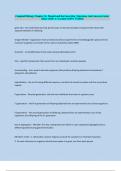Exam (elaborations)
Campbell Biology Chapter 14- Mendel and the Gene Idea | Questions And Answers Latest {} A+ Graded | 100% Verified
- Course
- Institution
Campbell Biology Chapter 14- Mendel and the Gene Idea | Questions And Answers Latest {} A+ Graded | 100% Verified
[Show more]



